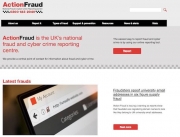

Crooks and scammers have been taking advantage of the Coronavirus epidemic to ramp up their fraud operations with a 400% increase in virus-related fraud in March.
Victims have lost nearly £1m in Coronavirus-related fraud since 1 February and cases in March were up four-fold.
Some fraudsters have been sending bogus investment scheme and trading advice urging people to take advantage of the coronavirus downturn.
Action Fraud, the fraud-fighting agency, said it had received 105 reports of fraud in the past six week with total losses reaching nearly £970,000.
The National Fraud Intelligence Bureau (NFIB) has highlighted the new trend in fraud.
The first report relating to Coronavirus, or Covid-19, was received on 9 February. There were 20 more reports that month.
Since then, there have been 46 reports between the 1 March and 13 March, and 38 reports in just four days (14 March – 18 March).
The majority of reports are related to online shopping scams where people have ordered protective face masks, hand sanitiser, and other products, which have never arrived. Other frauds reported include ticket fraud, romance fraud, charity fraud and lender loan fraud.
City of London Police said it had over 200 reports of coronavirus-themed phishing emails.
Some of the tactics being used in phishing emails include:
• Fraudsters claiming to be from the Centre for Disease Control and Prevention (CDC) and World Health Organisation (WHO). They claim to provide the victim with a list of active infections in their area but to access this information the victim needs to either click on a link which redirects them to a credential-stealing page; or make a donation via Bitcoin.
• Fraudsters providing articles about the virus outbreak with a link to a fake company website where victims are encouraged to click to subscribe to a daily newsletter for further updates.
• Fraudsters sending investment scheme and trading advice encouraging people to take advantage of the coronavirus downturn.
• Fraudsters purporting to be from HMRC offering a tax refund and directing victims to a fake website. The emails often display the HMRC logo.
Graeme Biggar, director general of the National Economic Crime Centre, said: “We have already seen fraudsters using the Covid-19 pandemic to scam people looking to buy medical supplies online, sending emails offering fake medical support and targeting people who may be vulnerable or increasingly isolated at home.
“These frauds try to lure you in with offers that look too good to be true, such as high return investments and ‘healthcare opportunities’, or appeals for you to support those who are ill or bogus charities. The advice is simple, think very carefully before you hand over your money, and don’t give out your personal details unless you are sure who you are dealing with.”
Anyone who suspects a fraud attempt is urged to contact Action Fraud.
Leave a Reply